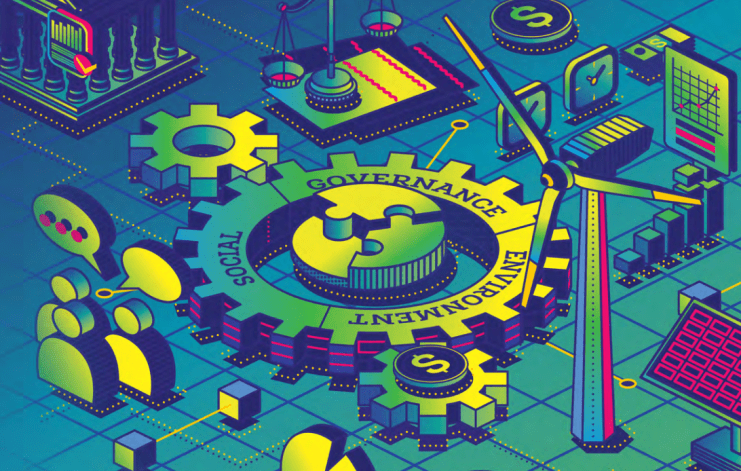How ESG has impacted technology and innovation sectors

Increasing examples of environmental, social and governance (ESG) targets linking to executive incentive pay (sometimes as much as 20%) represents a financially lucrative area business leaders need to ensure they are getting right. ESG is a broad term comprising interlinked yet distinctive ways to evaluate the sustainability credentials of a business, including corporate governance, inclusion and diversity, employee health and safety and community impact. With bonuses in the balance, ESG objectives have taken on further strategic significance. Companies now address every stage of their supply chain and business model, including the technologies and services they acquire.
The financial, social and environmental incentives around ESG provide the tech and innovation sectors with substantial opportunities to capitalise on. As the saying goes: ‘necessity is the mother of invention.’ Technology will underpin new products, processes and practices to support more data-driven decisions and ultimately push ESG commitments forward.
Greenwashing
Unfortunately, for some companies, ‘addressing’ ESG issues simply represents a box-ticking exercise. Despite compliance efforts from the government, artificially inflating environmental and social standards continues to be an uncomfortable reality in the corporate world. For ESG targets to be effective, they must be woven into everyday business operations, practice, and culture.
Thankfully, all is not yet lost. Innovations such as natural language processing (NLP) technologies have begun solving this problem. NLP — a form of artificial intelligence (AI) — can analyse billions of online articles to detect greenwashing or related risks. This technology can assist in holding deceptive sustainability marketers to account on a considerable scale.
Existing Technologies
Separating existing companies from the vibrant start-up community is essential when assessing the UK tech sector’s response to ESG. Established companies must commit to reworking their business models while new players benefit from infusing high ESG standards from the outset. The international clamour for greater focus on ESG has shed light on the energy efficiency of hardware and software technologies. The exponentially increasing demand for data from consumers, businesses, and emerging technologies, combined with the already high energy consumption of data centres (an estimated one per cent of worldwide electricity use), has forced data centres to be at the forefront of innovation in responding to ESG pressures.
Data centre companies like Interxion have pioneered energy-saving designs and harnessed new cooling strategies such as arctic winds and underground aquifers to reduce their carbon footprint. These efforts have evidently succeeded in the previous decade. Even as data use has skyrocketed, technological advancements such as processor efficiency improvements, idle power reductions and applications’ virtualisation have significantly reduced the number of servers and energy requirements.
Other efforts include carbon offsetting and renewable energy procurement. Google — an excellent example of best practice in this space — has set a target for all its data centres to operate on round-the-clock (RTC) renewable energy by 2030.
While this is by no means the end of the story for data centres, with an expected 8% increase in total electricity demand over the next decade, the agility and innovation demonstrated by this industry should be recognised and mirrored where possible.
Emerging Technologies
Measuring and finding solutions to businesses’ ESG impact is a fruitful area for emerging tech companies. For example, blockchain has enabled the development of trusted, standardised ESG data collection and reporting. Global manufacturers are using this technology to trace assets across the supply chain, improving their sustainability credentials and reporting procedures through transparency.
Quantum computing also provides exciting opportunities for tech companies to address internal energy waste management. With improved modelling and analysis, these companies can more effectively target ESG initiatives like cheaper, more efficient drug development or enhanced water treatment capabilities.
Diversity, Equity and Inclusion (DEI)
Despite advances in some areas of ESG, it is essential to be open about the inadequate progress on diversity, equity and inclusion (DEI) in the UK tech sector. Despite the exponential growth of the digital economy, the figures on DEI remain poor, with opportunities still falling into the hands of the same people. For example, women only hold five per cent of leadership positions in UK tech, and just 9% of IT Directors come from black, Asian, or minority ethnic groups (British Computer Society). The business case for DEI has repeatedly been made over the past decade, yet we appear to stagnate on progress. The responsibility falls on our industry leaders to command an inclusive culture. While more companies at least appear to prioritise DEI, the measure of success is in the numbers. London is the most multicultural city in the world; its workforce and board rooms should reflect that. Therefore, DEI must remain a top priority for those in positions of power – government leaders, CEOs, and boards. Investing in digital skills education cannot be overstated, and critical barriers to entering the industry, particularly foundational language, technical skills and personal aspirations, must be proactively dismantled. DEI needs addressing at a cultural level across the sector, but technologies can also help scale and support these initiatives. Tech vendors in this market have increased rapidly, with software able to identify and remove unconscious bias from hiring and promotion decisions leading to more significant equity in payroll along with reliable tracking of progress towards inclusion goals.
Looking ahead
ESG will continue to be a guiding facet for the tech and innovation sectors. Existing companies in the industry have had to step up to ESG expectations from customers, investors and other relevant stakeholders. New emerging technologies are capitalising on the demand for innovative solutions to global problems and holding established industry players to account. ESG is a wide-ranging framework that is difficult to navigate comprehensively. There are multiple crucial, sensitive and complex issues at play. Therefore, while stakeholder expectations are rightly high, the fundamental principles for our sector to keep in mind are transparency, authenticity and a willingness to change.
Russ Shaw CBE is the Founder of Tech London Advocates and Global Tech Advocates